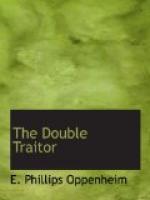“So long as I am saved,” he murmured, “tell me, please, where you would like to dine?”
“Any place on earth,” she replied. “You may call for me here at half-past eight. I shall wear a hat and I would like to go somewhere where our people do not go.”
Anna set down the telephone. The listlessness had gone from her manner. She glanced at the clock and ran lightly into the other room.
“Put all that splendour away,” she ordered her maid cheerfully. “To-night we shall dazzle no one. Something perfectly quiet and a hat, please. I dine in a restaurant. And ring the bell, Marie, for two aperitifs—not that I need one. I am hungry, Marie. I am looking forward to my dinner already. I think something dead black. I am looking well tonight. I can afford to wear black.”
Marie beamed.
“Madame has recovered her spirits,” she remarked demurely.
Anna was suddenly silent. Her light-heartedness was a revelation. She turned to her maid.
“Marie,” she directed, “you will telephone to Thurm House. You will ask for Lucille, the Princess’s maid. You will give my love to the Princess. You will say that a sudden headache has prostrated me. It will be enough. You need say no more. To-morrow I lunch with the Princess, and she will understand.”
CHAPTER XXV
“Confess,” Anna exclaimed, as she leaned back in her chair, “that my idea was excellent! Your little restaurant was in its way perfection, but the heat—does one feel it anywhere, I wonder, as one does in London?”
“Here, at any rate, we have air,” Norgate remarked appreciatively.
“We are far removed,” she went on, “from the clamour of diners, that babel of voices, the smell of cooking, the meretricious music. We look over the house-tops. Soon, just behind that tall building there, you will see the yellow moon.”
They were taking their coffee in Anna’s sitting-room, seated in easy-chairs drawn up to the wide-flung windows. The topmost boughs of some tall elm trees rustled almost in their faces. Away before them spread the phantasmagoria of a wilderness of London roofs, softened and melting into the dim blue obscurity of the falling twilight. Lights were flashing out everywhere, and above them shone the stars. Norgate drew a long breath of content.
“It is wonderful, this,” he murmured.
“We are at least alone,” Anna said, “and I can talk to you. I want to talk to you. Should you be very much flattered, I wonder, if I were to say that I have been thinking of little else for the last three or four days than how to approach you, how to say something to you without any fear of being misunderstood, how to convince you of my own sincerity?”
“If I am not flattered,” he answered, looking at her keenly, “I am at least content. Please go on.”
“You are one of those, I believe,” she continued earnestly, “who realise that somewhere not far removed from the splendour of these summer days, a storm is gathering. I am one of those who know. England has but a few more weeks of this self-confident, self-esteeming security. Very soon the shock will come. Oh! you sit there, my friend, and you are very monosyllabic, but that is because you do not wholly trust me.”




